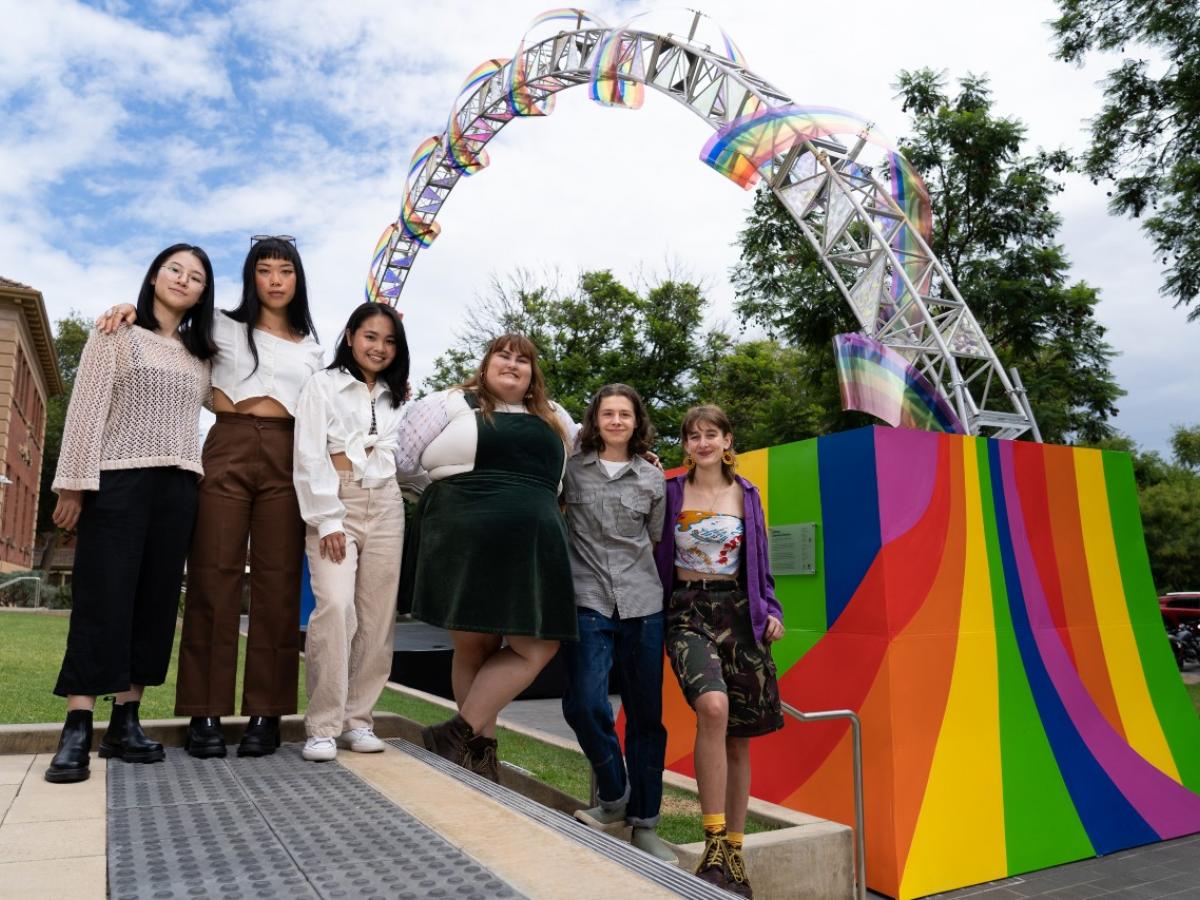University community remembers George Duncan

Some of the architecture students who worked on the arch design (from left): Whitney Fei Yang Huang; Miah Thorpe; Quincy Nguyen; Katherine Queen, Dylan Fuller and Fleur Liveris.
It was half a century ago this year that a quiet and unassuming law lecturer at the University of Adelaide lost his life after being thrown into the River Torrens in a hate crime that shocked the nation.
It’s never been forgotten, though - and on Wednesday evening, the University community will be commemorating that tragic event 50 years on with a special tribute on North Terrace campus (Wednesday 2 March).
Prior to his death, Dr George Ian Ogilvie Duncan, then aged 41, had only been back in Australia for a short time, having arrived from the UK just a few weeks earlier to take up his new position at the Adelaide Law School.
Not much good can ever come from the killing of another human being (and for no other reason in this case than his presumed sexuality), but ultimately it did. The tragedy eventually led to groundbreaking law changes in South Australia that still form the basis of similar legislation around LGBTQI+ rights enacted later across the country - and the university became instrumental in the campaign.
University of Adelaide Vice-Chancellor and President Professor Peter Høj said: “Dr Duncan’s death was a terrible tragedy and this tribute is sad and solemn in many ways. It was also a watershed moment in our history - and we have always valued diversity at the University of Adelaide and continue to work hard to recognise LGBTQI+ rights and support diversity within our community.
“This event is a reminder of the progress we have made, but it must also be a strong reminder of how much further we have to go to ensure that our society is guided by enhanced mutual respect and inclusivity.”
Dr Duncan’s death was an important moment in Australian history - and this week the University will solemnly contemplate his memory and ponder his incredible legacy. Guest speakers and invited VIP’s will attend the function, followed by a walk of solidarity from the Cloisters to the Festival Centre. They will walk over the University of Adelaide Footbridge and along the Torrens past the spot where he died. Guests will then watch a preview performance of the oratorio Watershed: The Death of Dr Duncan at The Dunstan Playhouse, which opens officially the following night as part of the Adelaide Festival.
“This event is a reminder of the progress we have made, but it must also be a strong reminder of how much further we have to go to ensure that our society is guided by enhanced mutual respect and inclusivity.”University of Adelaide Vice-Chancellor and President Professor Peter Høj
On Monday 28 February, the 24m long x 10m high Dr Duncan Rainbow Campus Arch (LGBTQIA+ Celebration Rainbow) was unveiled on the University grounds facing the river, where the event will be held. The arch – a steel truss with acrylic panels wrapped in a swirling vinyl and composite rainbow – was designed by students from the University’s School of Architecture and Built Environment.
The event is an entirely fitting tribute: the University – and the law school in particular - played a major role in making sure investigations into the Duncan killing were never swept under the carpet and that enough public pressure was applied to the Government of the day to change the law. Until then, homosexual acts between consenting male adults were illegal and punishable by law.
At the time, Professor Horst Lucke was head of the Adelaide Law School and had been instrumental in hiring Dr Duncan. He took up the fight in the tumult that followed the killing, publicly advocating for the law changes, defending Dr Duncan’s reputation and meeting in secret with gay men desperate to have their voices heard and who’d been moved enough by the death to push past their fears and join the growing groundswell calling for change.
As Professor Lucke, now aged 92 and who still works today at the University of Queensland law school at St Lucia in Brisbane, explains: “It became a cause celebre and we were determined not to let it go.”
The result of that pressure was that in 1975, the government of Labor premier the late Don Dunstan introduced legislation into the SA Parliament decriminalising homosexual acts between consenting males, and making the age of consent consistent across the board - and became the first state to do so.
The arch will be up until the weekend of 19-20 March at the Cloisters overlooking Victoria Drive and the river.
Guests and speakers at Wednesday’s event will include Professor Høj; alumni historian Tim Reeves; Adelaide Festival co-artistic directors Rachel Healy and Neil Armfield AO (who is also director of the Watershed oratorio preview); members of the University’s ally network and pride club, and George Duncan historian and drag queen Dr Gertrude Glossip.
Uncle Rod will give the welcome to country, and guests at the event will be given a flower, which they will be asked to place at the bases at each end of the arch, which were specially designed for that purpose.
Media contact:
Stan Denham,
Media Officer,
The University of Adelaide.
Mobile: +61 (0)422 000 131
Email: stan.denham@adelaide.edu.au
